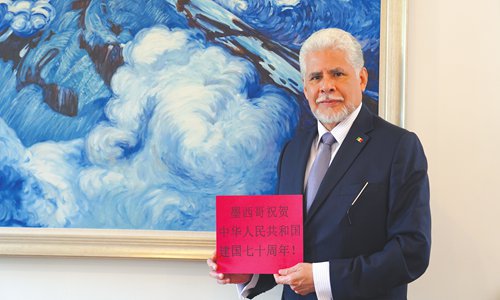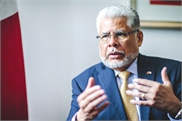IN-DEPTH / DIPLOMATIC CHANNEL
Mexican Ambassador: Chinese, Mexicans share a common goal

The Mexican Ambassador to China Jose Luis Bernal Rodriguez cheers for the 70th PRC founding anniversary. Photo: Yin Yeping/GT
The word globalization is no longer just a vision, but a tangible thing that brings the people on the opposite sides of the Pacific closer together. Several decades ago, fruits, such as avocados, were a rarity in China. Now, they can be found everywhere, becoming a part of people's daily diet. As early as 2005, Mexican avocados entered China and almost dominated the market. As the world's largest avocado producer, Mexico has also become well-known to the people in China.Today, fruits are not the only things that people in China know about Mexico. Movies like Coco (2017), festivals like the Day of the Dead, cumbia dancing, Mexican food and tequila build up the multi-dimensional image of the country among Chinese people. As China's opening market provides great opportunities for the spread of Mexican products and culture, China has influenced Mexico and the Mexican people. Today, China is Mexico's second largest trading partner, and an important source of imports as well as a destination of exports.
On the occasion of the 70th anniversary of the founding of the People's Republic of China (PRC), the Global Times talked with the Mexican Ambassador to China Jose Luis Bernal Rodriguez who shared with us how China can be an example for Mexico and what brings the two countries closer.
Political dialogue matters
There are many elements that contribute to the connectivity between the people of the two countries. Bernal understands that whether it is culture, trade, or the people, the foundations of bilateral ties have to do with the level and the depth of political dialogue, since it provides all the possibilities for more interactions and exchanges. "For anybody who wants to relate with China, Chinese leaders and the people, they need to have this kind of dialogue," the ambassador said. "We might not understand each other's languages, but we can understand each other's minds and aspirations. I witnessed different moments where leaders established these approaches and this has happened historically." Over the last 50 years, every Mexican leader has visited China and Chinese leaders have also visited Mexico.
Growing connectivity
In the context of these continuous dialogues, bilateral trade and investments have also increased. Today's opening-up of the Chinese market not only brings trade, but also new opportunities for Mexico's economic development. The ambassador said that this is reflected not only in the bilateral exchanges, but also in the fact that many of the Chinese goods are being manufactured in Mexico, which means more jobs for Mexicans and the creation of additional value that will be exported to other markets. "We created value chains between Mexico and China, which is reflected in the volume of trade and the additional investment. These are the tangible sectors in which we can measure the progress in our bilateral relationship," he said.
In the past several years, there has been a growing record of bilateral exchanges in tourism and education. In the recent interview, the ambassador also mentioned his attitude towards these exchanges. "We are happy to see that apart from trade and investment, there are more people-to-people exchanges," Bernal said. "I have been witnessing a very rapid increase of institutional agreements to have more educational exchanges. More students from Mexico are interested in coming to China to pursue their studies and vice versa."
When Chinese language and culture are like magnets to the Mexican students, the best choice is to come and learn and experience it in person. "I cannot explain in words to them what is happening in China, so they have to go out and see it. This is increasing the interest on the two sides of the Pacific, and more people are taking part in the tourism exchanges," the ambassador said.
Among the increase in the exchanges, food also plays its role. "Another thing that I would like to talk about is how people in China are enjoying Mexican food. Traditionally, Chinese food has been well known in Mexico and throughout the world. At the end of the day, what we are really sharing is the way we value family and traditions and the way we like to enjoy life," Bernal said.
China is an example
Bernal has also paid attention to how China's economic reforms have brought about the changes to the lives of its people. In this case, he believes there is something in common between China and Mexico.
"We have to remember that the developing countries have many commonalities, such as poverty, lack of development, education and social interests and aspirations, and there are many lessons we can draw from China's experiences," Bernal said. "The first one we look at is related to the fight against poverty since China has been able to achieve such a big success in lifting its people out of poverty. We have also been studying the way that the opening-up and reform policy works in China and how it means in terms of supporting specific sectors in companies to be able to compete in international market and how we can continue to further develop our own economy and address social needs."
After several years of adopting the reform policies, particularly from 2000 to 2004, Mexico started to create additional institutional mechanisms for cooperation. "Only nine years later, in 2013, China and Mexico agreed to upgrade their bilateral relationship to the level of a Comprehensive Strategic Partnership. So, we have enjoyed this concept for the last six years," he said.
Now as the developing countries, both China and Mexico are facing new challenges. The ambassador said that every country has to continue working by itself and with others for the preservation of multilateralism. "Globalization is facing many challenges, and every country has to be ready for new policies and restrictions coming from other countries," he said.

